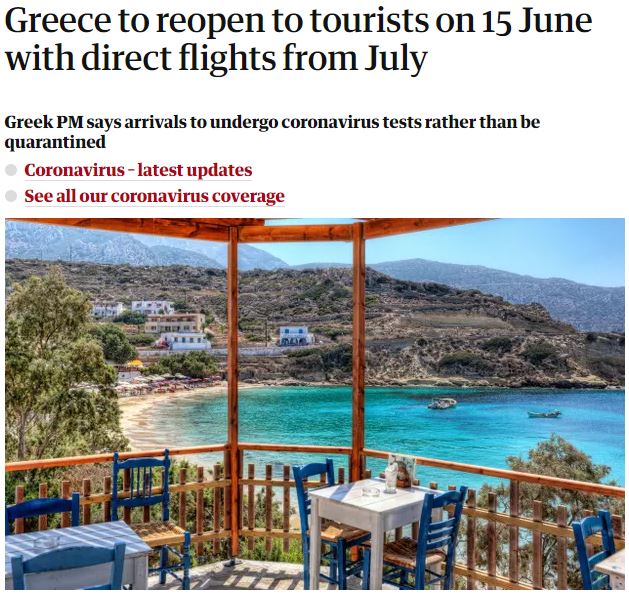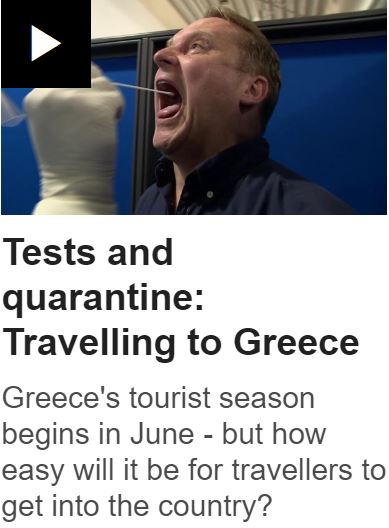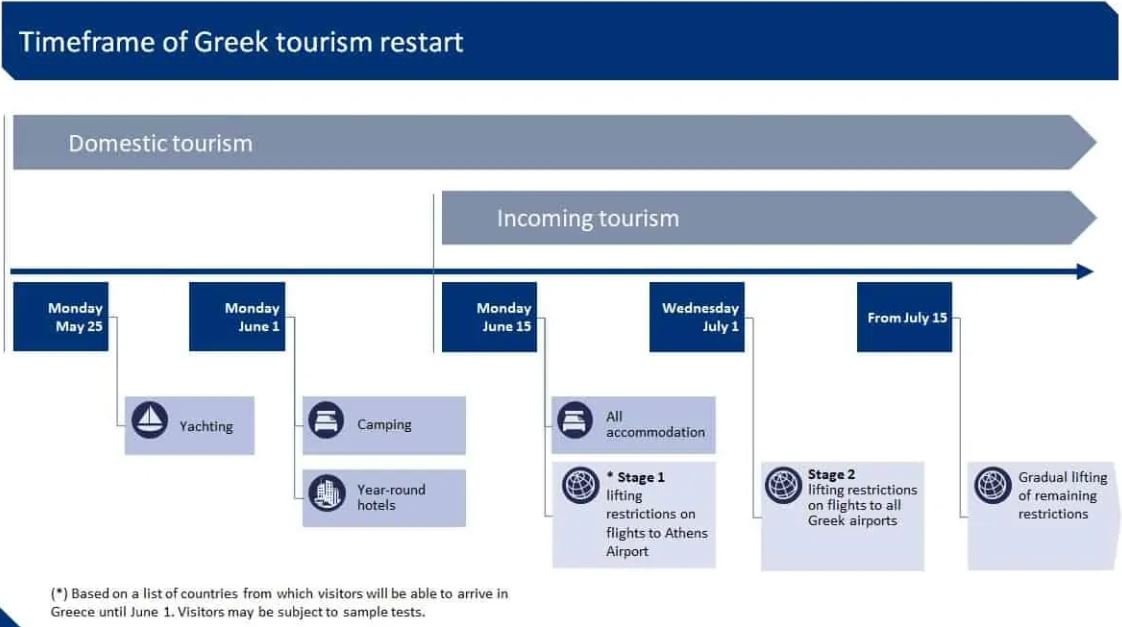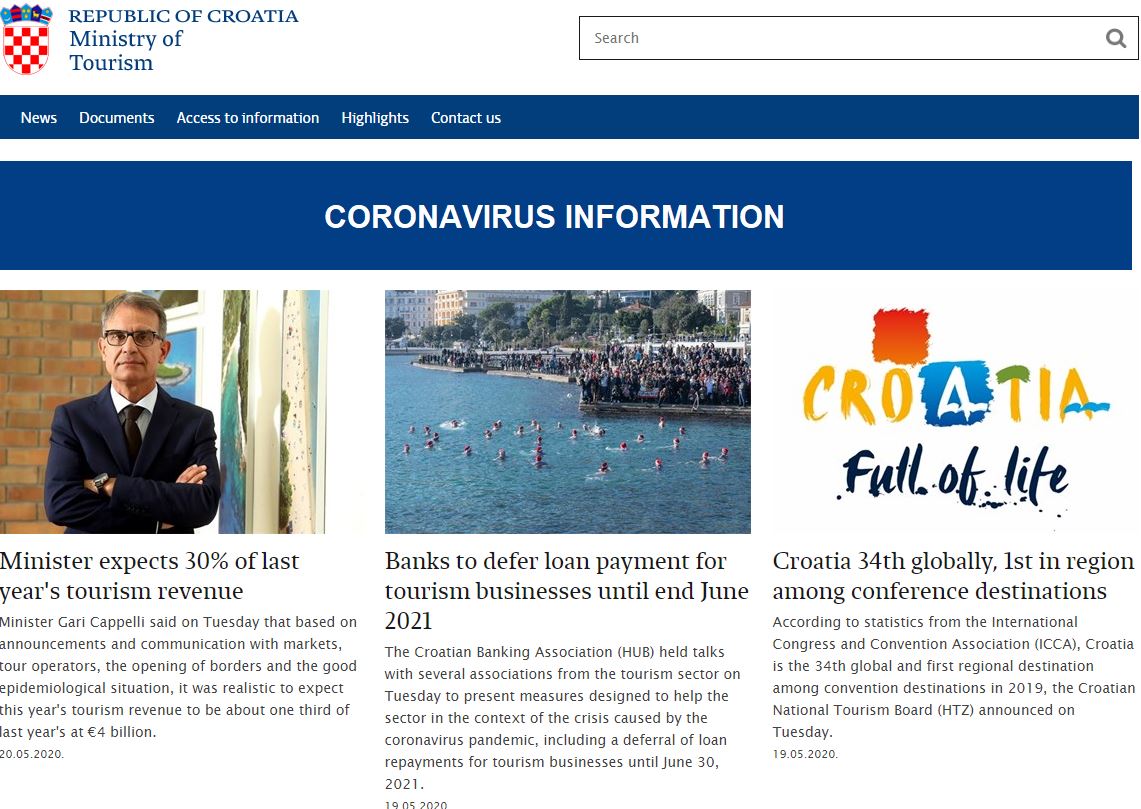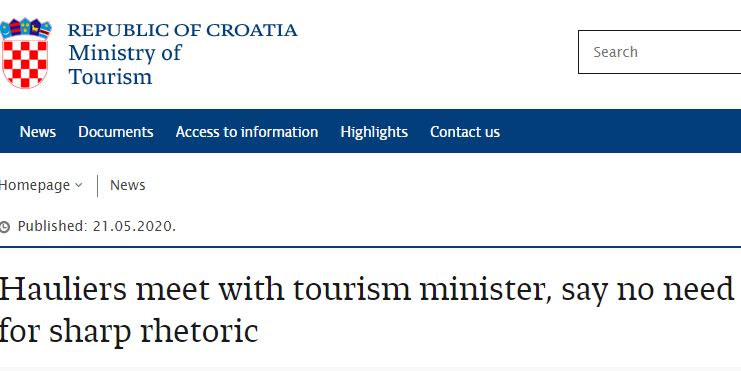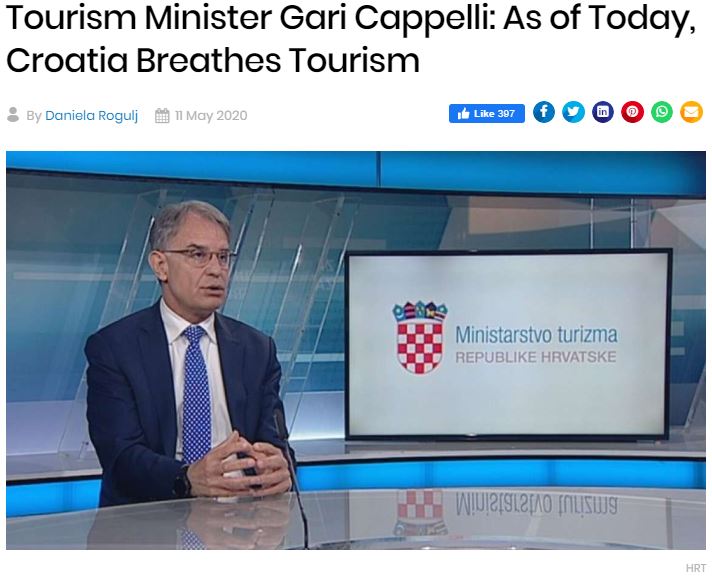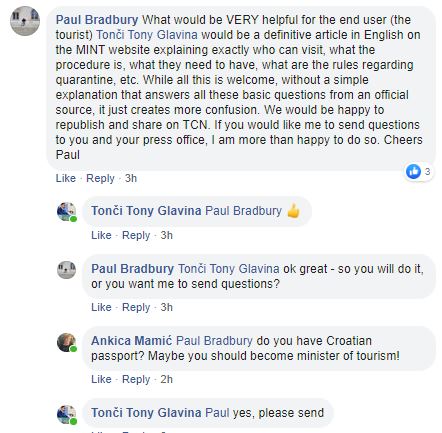Ministry Gives Info on Requirements for Entry in Croatia
ZAGREB, May 22, 2020 - Tourists from EU member-states who have booked accommodation in Croatia are supposed to show documents confirming the booking, when they enter the country, the Croatian Ministry of Interior Affairs says on its web site.
This site contains frequently asked questions and answers regarding the conditions of entry into Croatia considering the restrictions in place to prevent the spread of COVID-19 and answers are available currently in Croatian, German and English in the site's section UZG COVID.
Foreigners possessing property or a vessel in Croatia are supposed to show the document, for instance, a title deed or a purchase contract, confirming their ownership, when they are arriving in Croatia.
Considering the questions about self-isolation, the ministry says that "the measure of self-isolation is no longer imposed on all passengers on border crossing points when entering the Republic of Croatia."
Leaflet with HZJZ instructions to be given to persons entering Croatia
"It may be imposed only on individuals for whom it is determined during border checks that they have been in contact with a person infected with COVID-19."
"However, when entering the Republic of Croatia, border police officers will provide you with a leaflet containing instructions and recommendations issued by the Croatian Institute of Public Health (HZJZ) which you have to comply within the following 14 days," the ministry said.
Thus, the ministry presents the 11 most frequently asked questions and answers to them, considering the conditions and the status of travellers entering Croatia as of 22 May.
As for the COVID-19 infection, Croatia has single-digit daily statistics for weeks.
Profit Driven Destruction: Help Us Save the Forest of the Animal Shelter in Nemetin
May 22, 2020 - Today, May the 22nd, marks the international day for Biological Diversity and Nature Protection. In a suburban village called Nemetin, near Osijek, members of Udruga Pobjede (Azil Osijek shelter) encountered Croatian forest workers tearing down the woods near the animal shelter in Nemetin, which happens also to be the only place of land where they can actually take their 300+ dogs for a walk.
Growing up in the 90s, one of the cartoons I remember most vividly is FernGully: The Last Rainforest, a 1992 film that follows Zak, a young slacker working for a logging team cutting down trees in the rainforest. Little do they know, but they're getting closer to a magical place called FernGully and its fairy inhabitants. Crysta, a young fairy with slight magical abilities, shrinks Zak down to fairy-size, and together they fight to save the home that is threatened by logging, and a polluting force of destruction called Hexxus.
That a cartoon could influence a then 5+-year-old to stop and reflect does seem a bit sci-fi for some full grown-up representatives of governmental institutions today and their blindfolded acts.
Reading the criticism pointed towards all the Croatian institutions nowadays may seem a bit like Groundhog Day – and we're condemned to relive it over and over again in Croatia. Only as opposed to the movie, this story is far from witty and resonant. If there were a competition for the lousiest Croatian institution that has done the most harm to its citizens and its ecosystem, it would very hard to decide. Let me cut the tension and come forward, this time my vote goes to the Croatian Forests d.o.o. The million-dollar question is, what could someone even expect from an institution that was using horses in summer 2019 to pull logs for days in the heat?
For those that don't know the story, here's something that might make you stop and think:
The horses were overwhelmed, logs were falling at their feet, as they were slipping on the road and endangering traffic. Animalex - The Association for the Legal Protection of Animals even published a video of a horse pulling logs that kept falling over. Those horses were working for Croatian Forests for days!
According to Article 5 (2) of the Animal Welfare Act, the use of horses (and other equines) for the removal of logs from forests and the removal of firewood is prohibited, except in hard-to-reach areas where this is not possible without the use of such animals. Citizens who were there are witnesses that the space was not inaccessible. The only response Croatian Forests d.o.o. issued back then was that the terrain is inaccessible. Of course, this was not true and it's clear that the inaccessibility of the terrain is just an excuse:pulling logs with horses is faster and more profitable for them.
And this is exactly the scenario that keeps repeating itself and the gift of Croatian Governmental institutions that just keeps on giving. Whatever they want to do, they can do it without any needing to fear any consequences. If someone dares to ask, then their rulebook states that they must cram that person full of noncombustible data, and choke them with ''facts'' to the degree that they feel stuffed. Then they'll feel they're actually thinking; they'll get a sense of motion without actually moving. And they'll be happy, because facts of that sort don't change.
Afterward, they might even shamelessly boast on their official website boasts that 90 percent of their income comes from the sale of wood.
Fast forward to 2020:
Today, May the 22nd, 2020 is the International Day for Biological Diversity and Nature Protection, and in asuburban village called Nemetin, near Osijek, members of Udruga Pobjede (Azil Osijek shelter) recently encountered Croatian forest workers tearing down the wood near the animal shelter in Nemetin, which happens also to be the only piece of land where they can actually take their 300+ dogs for a walk.
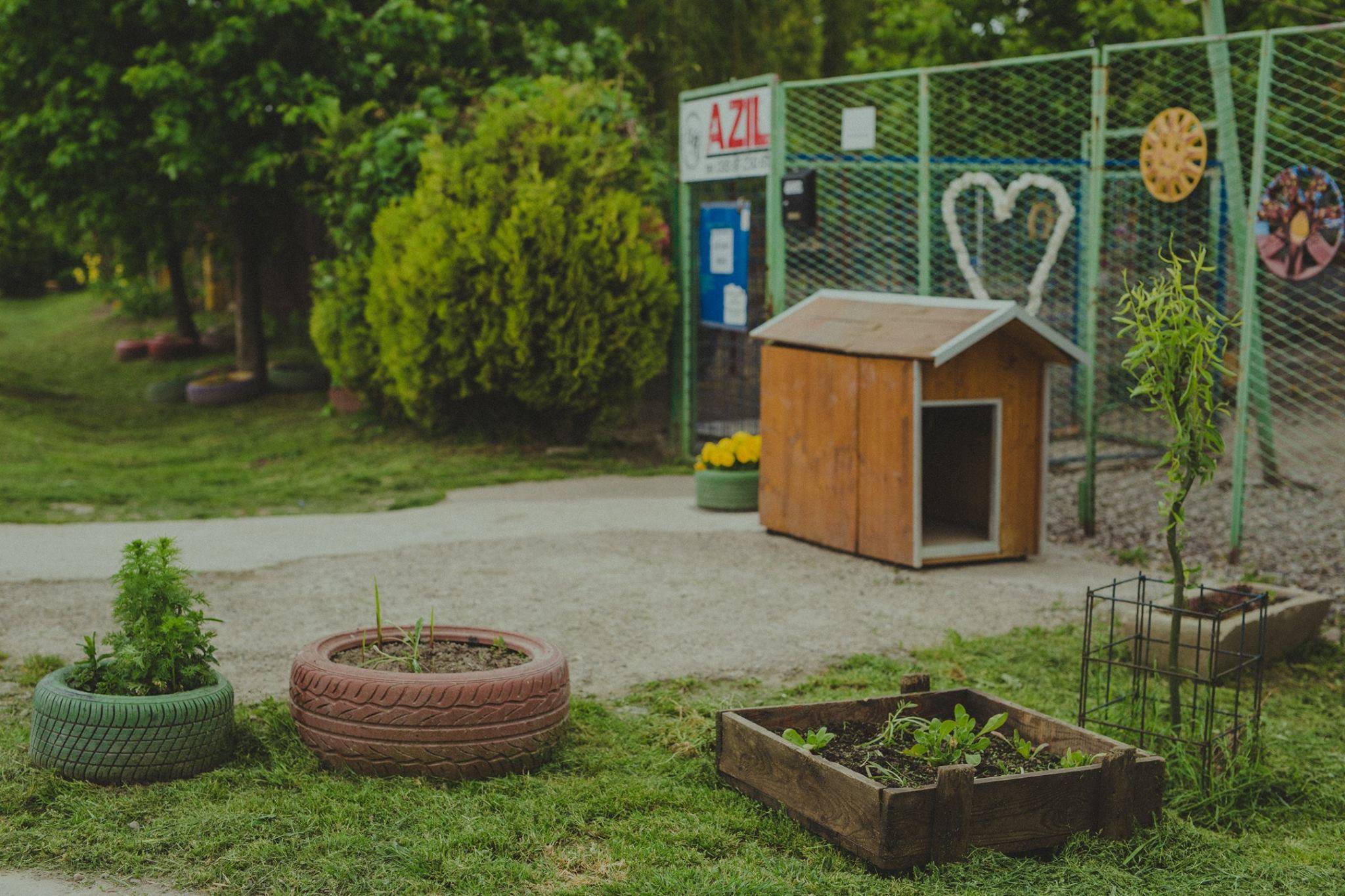
These people aren't ignorant, they're very well aware that the forests should be maintained. They know that old, diseased trees need to be removed, and young shoots need to be planted, but there are still so many questions left unanswered and the members of Udruga Pobjede are now desperate. Why is Croatian Forests d.o.o cutting down this forest now at the time when birds are nesting, and so by killing the trees, they're also killing the birds. Are they even aware that when taking a walk there, it is not rare to see wild boar and other animals? Are they aware that these animals will have nowhere to hide from hunters and poachers? Do they know how much oxygen they will deprive Osijek of?
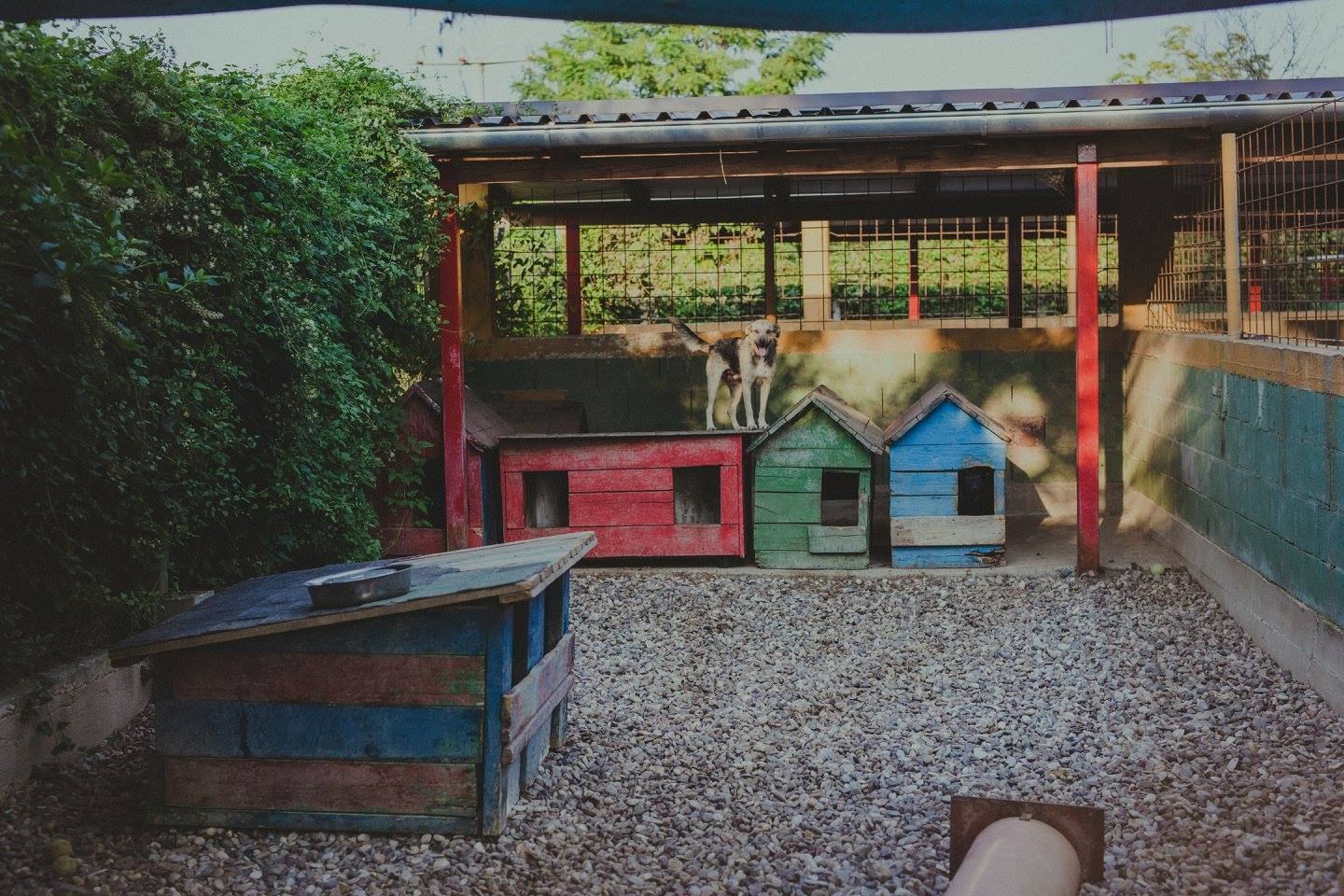
By cutting down these trees, they will take away the last little bit of joy these dogs that are taken care of by volunteers have. Is there really no other solution? Can't it be done gradually? Is profit the only value they know of?
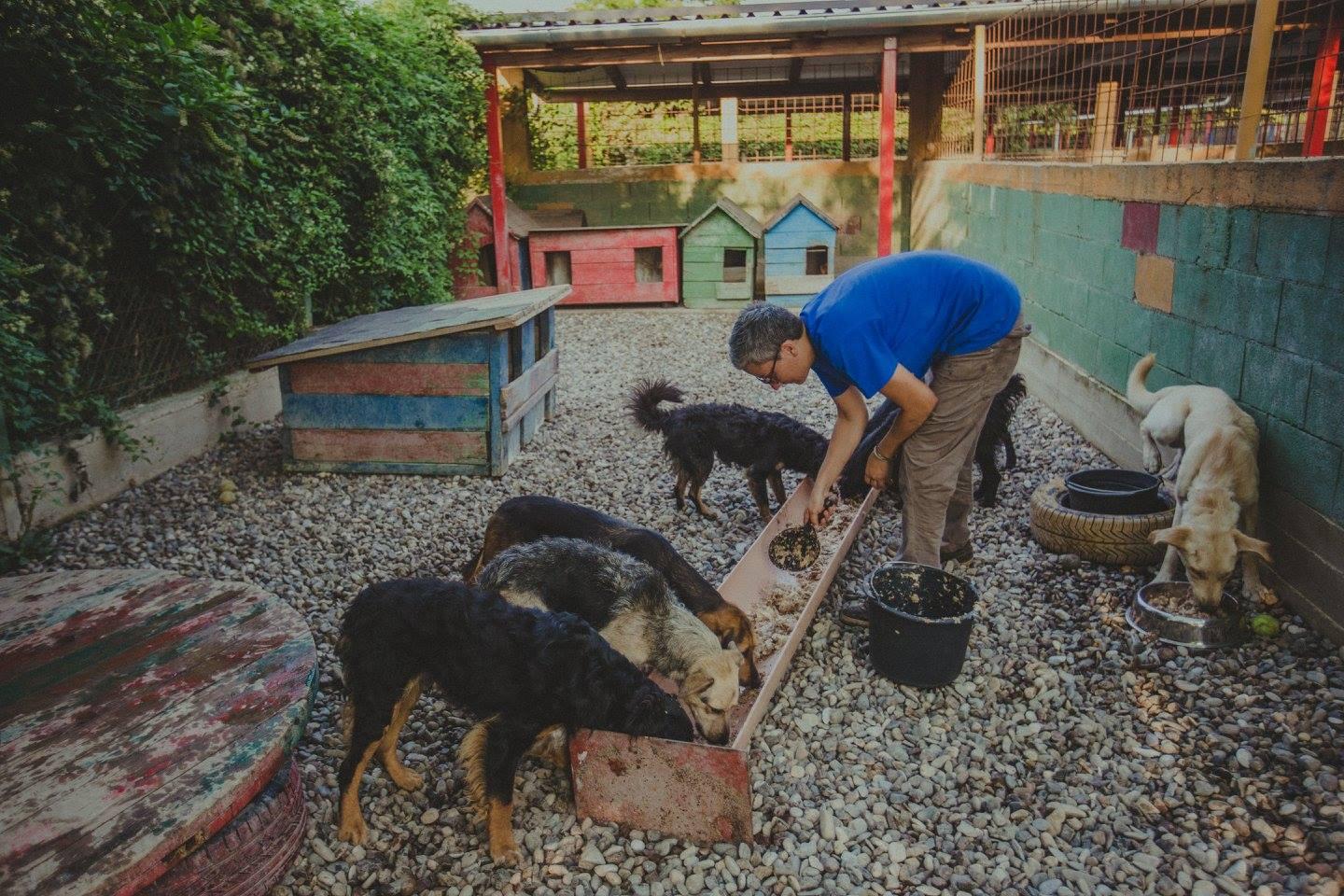
For these dogs, and for the people that arrive there every single day to walk them, this forst is the only piece of land where they can feel free and a little bit less alone. As I took the time to write this as fast and as soon as I could, just how many trees were lost? The workers said the plan is to tear every single one down, leaving the people sad and devastated, and the dogs and other animals without shade and shelter.
In 2010, the same people officially took over the shelter for abandoned animals in and in December 2011, they registered it as the 23rd shelter for abandoned animals in Croatia and one of the first no-kill shelters in the whole country. Thanks to this association, so many lives have been saved, so many dogs have found their “forever homes”, and so many injured and hungry dogs have been fed and taken care of. They are doing this every single day. They are willing to do whatever it takes to prevent the removal of the trees from happening. This time they can't do it alone – they need all the help they can get. And we need to act fast.
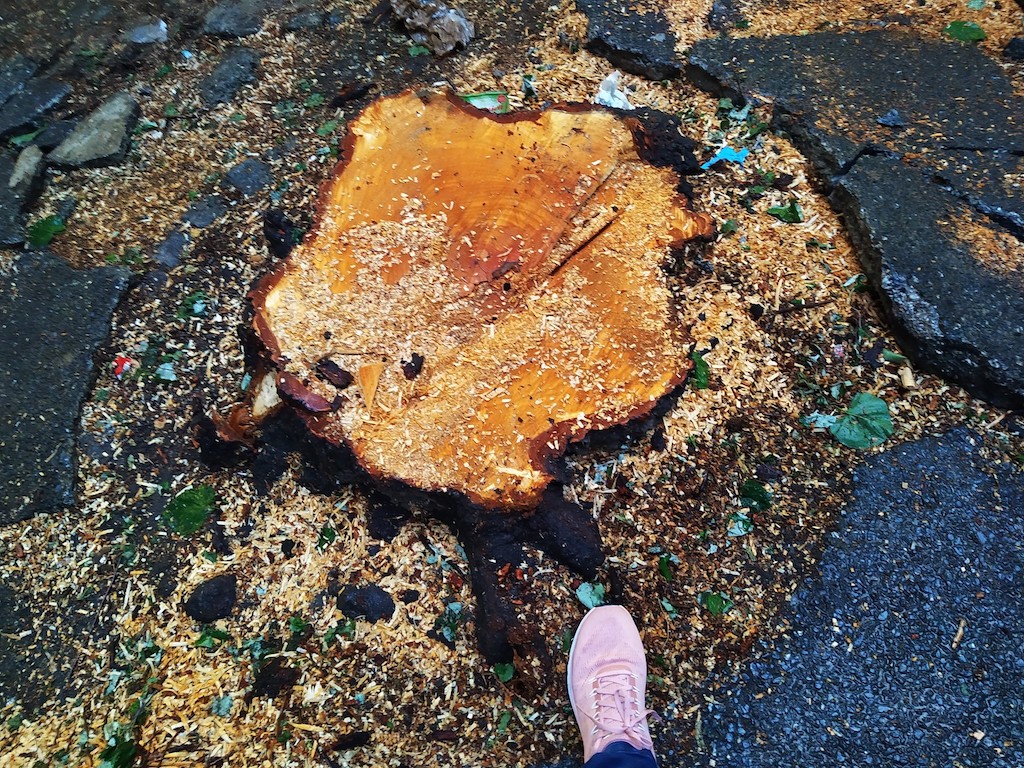
Ironically, when adopting the budget for 2020, the City of Osijek boasted a generous budget for the NGO sector. But given the COVID-19 situation, they abruptly decided to suspend all tenders for funds from the city budget for the NGO sector in order to "redirect" the money to mitigation - to deal with the economic consequences of the COVID-19 crisis. Of course, this is understandable as we're economically endangered, this includes the budgets for local self-government units. But how come there is no money for the work of associations for children and youth, no money for cultural activities - but they have the funds for such expensive horticultural interventions and the demolition of entire parks and woods? In the middle of an epidemic, is this really our top priority?
Nemetin is not the only place with this issue. People are shocked and have shared pictures of Markusevecka gora and Moslavacka gora, which look like a hurricane has passed through them.
30 kilometres away from Osijek, in Vinkovci, a similar story is unfolding. One woman, Mrs. Dajana Zucic, is standing almost alone in the fight against the felling of healthy trees in her neighbourhood. Trees are being cut down as part of a project, allegedly "works on the reconstruction of the drainage network" that will cost the lives of the neighbourhood's mature trees.
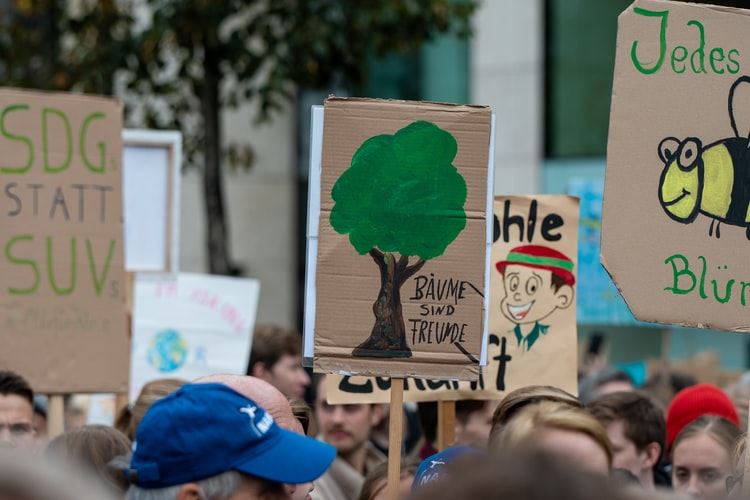
Mrs. Zucic has been trying to voice her and the neighbourhood's concerns about the project and has addressed the mayor; reported the situation to the Environmental Fund; reported it to DIRH; addressed the environmental inspector responsible for her area; contacted Nature Conservation Associations; founded a group; set up a petition; wrote and sent to the city administration an e-mail with daily photographs of the devastation; made a lot of phone contacts and had a lot of correspondence - all without any success. In the meantime, they received a response from the County Inspectorate for Nature Protection that they have carried out an inspection following a report and issued a statement that they have inspected all of the trees intended for felling and determined that there are no nests or cavities in the allocated trees in which strictly protected bird species might live.
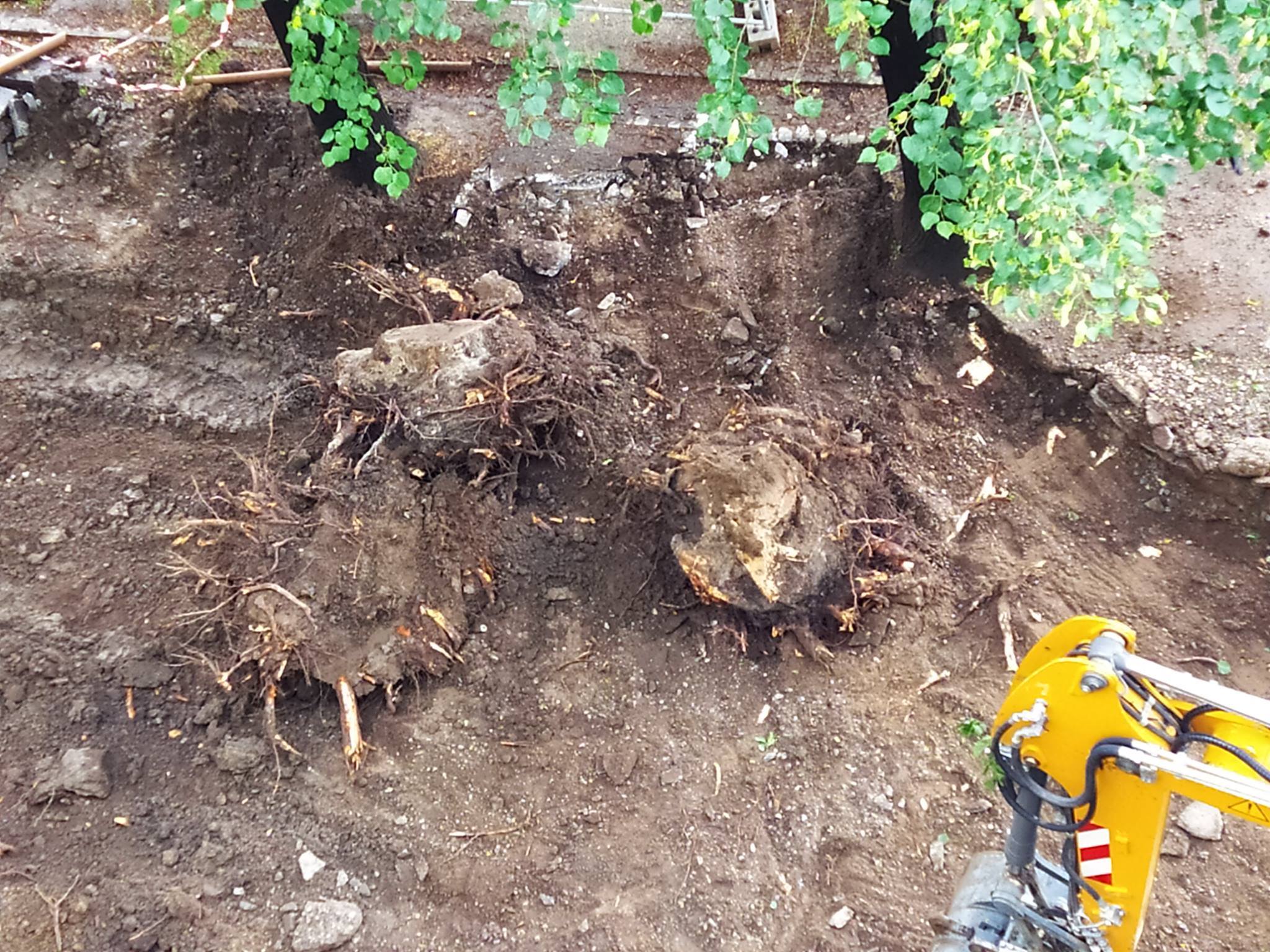
Too little, too late. It’s going to be like a tornado swept right thought Antun Mihanovic street in Vinkovci. The trees are priceless to the neighbourhood and they think everything could be done differently. Doing it in this way is utter devastation. Most of the trees in this neighbourhood are linden trees, and in most of those trees - birds, nests and even birds of prey like owls can be found. Has Vinkovci even considered bird habitats and nesting periods? Taking into consideration that they are used to getting away with anything, probably not. The fate of these trees and the final appearance of the "public pedestrian area" is being decided by Cestorad and Vodovod Vinkovci. In only fifteen days, the complete park has been torn down and no one has been held accountable for it.
It's time to do something and to send a signal against the destructiveness of short-sighted politics.
As devastating as it may be, it is an indisputable fact that the legislation in Croatia has been significantly improved, primarily due to Croatia's accession to the European Union, but there is still a lot of work to do. Because it is our obligation to contribute to the common good of our society, we need to act now. We need to aim at an economic recovery model that gives back to our society more than it takes away from it.

I'm sure – at least one person reading this will call us tree huggers who don't have anything smarter to do, and correct us, claiming that there are bigger problems. If you recognised yourself in this sentence, this article is then especially for you. We all need to be bothered once in a while. How long is it since you were really bothered? About something important, about something real?
“It doesn't matter what you do... so long as you change something from the way it was before you touched it into something that's like you after you take your hands away.”
Don’t silence your inner voice. You're doing yourself a disservice if you aren't guided by your moral compass. Be honest both with yourself and with all your actions consecutively.

If there's something that makes you uncomfortable, maybe it's not a matter of aligning your emotions with the status quo, but vice versa.
I'm sure for some, there is no burden too heavy and no fight to big, but in this, the people and the dogs need our help – our voices – and it's time to come together for sustainable and fair Croatia 2.0 - beyond the deadly logic of capitalism. Together we can save the forest in Nemetin, and maybe what is left of the trees in Vinkovci – and try to establish a system that is responsible and in which no living being is exploited for profit.
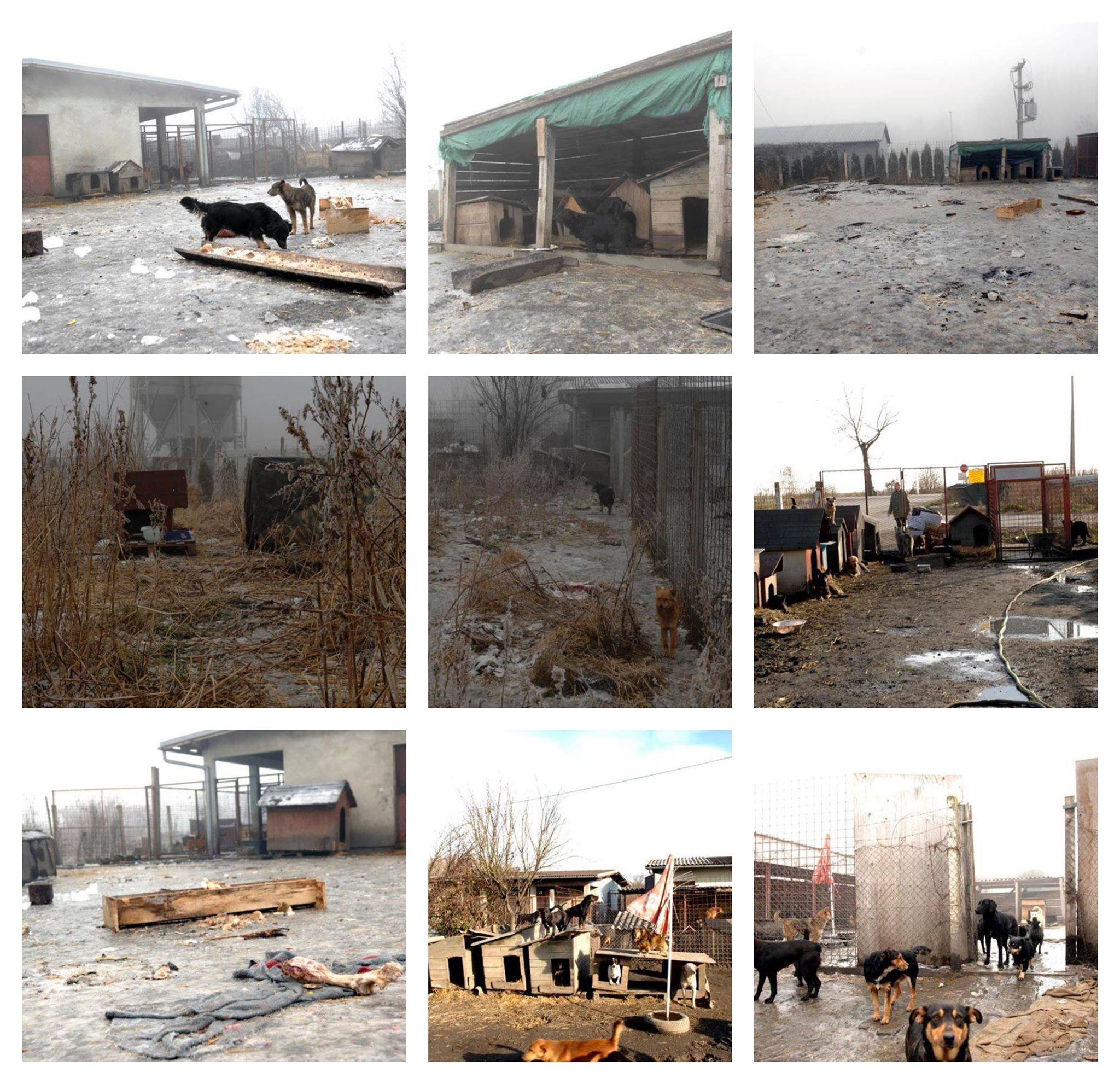
AZIL Osijek before
Do you know how crucial the protection, restoration and conservation of nature are in Europe's recovery from the economic crisis, and how important nature is for people's mental and physical well-being? It is also important for society’s ability to cope with global change, health threats, and disasters.
And it is precisely this coronavirus pandemic that has raised our awareness of the connection between human health and the ecosystem. We urgently need to bring nature back into our lives and protect, restore and preserve biodiversity, which should be a priority as the ecosystems are the most important part of responding to the global health and environmental crisis, and they remain an important aspect to ensure the long-term survival and well-being of our societies.
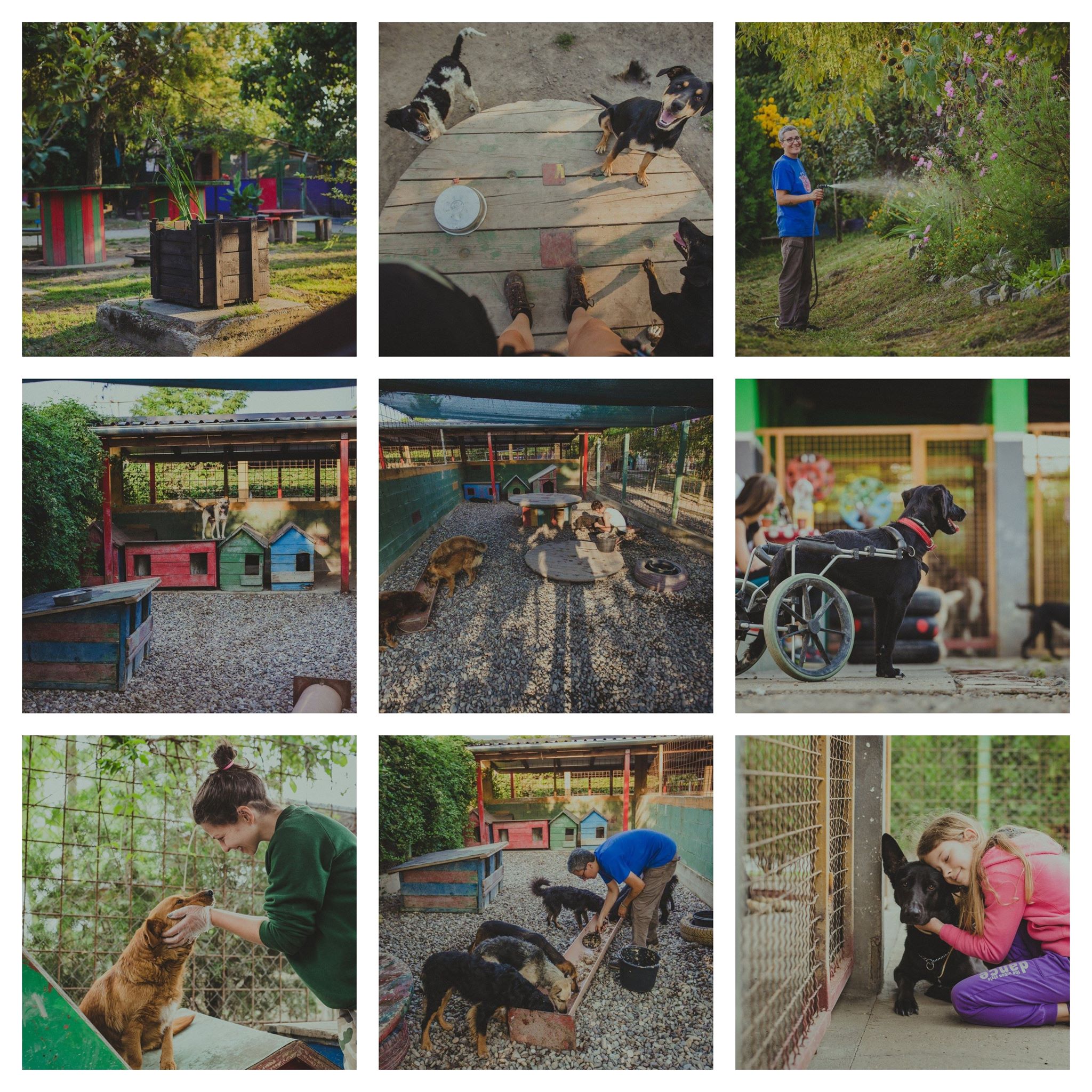
AZIL Osijek after
To read more about lifestyle in Croatia, follow TCN's dedicated page.
CROMADS: Zašto biste se trebali preseliti u Hrvatsku, s ili bez Uhljebistana
22. svibnja 2020. - Dok tisuće napuštaju hrvatsku, zašto biste se vi preselili u Hrvatsku - da, zaista! Zaboravite na Uhljebistan, zaboravite na turizam, ovo su CROMADS.
Svi ćemo se zauvijek sjećati ovih posljednjih nekoliko mjeseci. Toliko nesigurnosti, toliko promjena, toliko vremena da razmislimo o prošlosti i budućnosti. Mislim da smo se svi promijenili barem malo zahvaljujući koroni. Ili smo se promijenili mnogo.
Meni je ovih posljednjih nekoliko mjeseci prošlo kao u magli. Nikad nisam više radio u životu, i tih sat vremena koje sam sam provodio uz Jadran svaku večer nakon što sam cijeli dan pisao o smrtima i bolesti pomoglo me održati normalnim. I dalo mi je jasnoću.
Sada vidim svijet drukčije nego što sam ga vidio prije godinu dana, posebno kad se radi o Hrvatskoj. I ništa mi nije jasnije od toga kako je ova seizmička promjena u našim životima Hrvatsku postavila u savršen položaj da preokrene svoje opadanje broja stanovnika, stvori bogatstvo i pomakne ovu zemlju prema naprijed.
S ili bez Uhljebistana.
Nekad sam mislio da je moguće reformirati sustav ovdje, a moji hrvatski prijatelji smijali su se mojoj naivnosti. I bili su u pravu. Ali, posljednja me godina natjerala da shvatim da je sav trud uložen u nastojanja da se popravi Uhljebistan i provedu reforme zapravo posve uzaludan. Energija je to koja se može bolje usmjeriti u novim, pozitivnim smjerovima, kao što je moj novi koncept - CROMADS (skraćenica od Croatia i nomads, nomadi; nomadi u Hrvatskoj).
Potpuna nesposobnost Ministarstva turizma, koju predvodi ministar-heroj sa svojim sloganima za vrijeme doba korone poput "Hrvatska diše turizam", dok istovremeno nisu u stanju objaviti bilo kakve korisne savjete za putovanja u Hrvatskoj, pokazuje - još jednom - da zaista nema nade. Pa, draže mi je, umjesto da nastojim popraviti Kraljevstvo slučajnog turizma, ismijavati ih i igrnorirati, na kraju ih učiniti besmislenima i nebitnima.
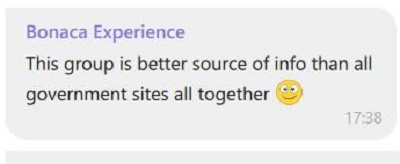
Pokrenuli smo zajednicu na Viberu, nazvanu Total Croatia Travel INFO prije nekoliko dana, saznati više i priključiti se možete ovdje. Prošlo je 8 dana otkad me zamjenik ministra turizma pozvao dapošaljem pitanja Ministarstvu, na koja će oni odgovoriti pa ću ja stvoriti stranicu koja će pomoći onima koji stvaraju 20 % hrvatskog BNP-a - turistima. I 8 dana kasnije dobio sam tišinu. Shvatio sam da ne odgovaraju medijima, stoga je za turiste još manja šansa da će dobiti odgovor, pa smo pokrenuli Viber community s namjerom da sve podatke stavimo na jedno mjesto (ako vas to zanima, pospremite link na ovaj naš članak u kojem je sve objašnjeno). Dopuštamo pitanja (i bilo ih je MNOGO), te odgovaramo koliko možemo, a one na čija pitanja ne možemo odgovoriti upućujemo na prave adrese e-maila. Reakcije su uglavnom vrlo pozitivne i posebno mi se svidio ovaj komentar koji sam primio od Bonaca Experience - hvala vam! Pridružite nam se (trebat će vam aplikacija Viber).
Jedan od ključeva uživanja u boljem životu u Hrvatskoj je toliko jednostavan, a s druge strane toliko teško ostvariv
Mindset.
Stanje duha.
Prije par godina, u [i]fičru[/i] napravljenom za britansko veleposlanstvo u Zagrebu, objasnio sam sve što bi strani investitor trebao znati o Dalmaciji u jednoj rečenici, za koju mi je trebalo 12 godina da je shvatim, ali čim je shvatite i prihvatite, život u Dalmaciji postane gotovo savršen. A ako je ne možete prihvatiti odmah, ili ćete je prihvatiti u budućnosti ili će vam se život pretvoriti u frustraciju. A rečenica je...
Nemojte pokušavati promijeniti Dalmaciju, ali očekujte da će Dalmacija promijeniti vas.
Stanje duha važno je i kad se obraćate Moćnoj Državi Uhljebistan. Umjesto da se nervirate i osjećate frustriranima, kako sam se ja osjećao godinana, ovih dana se osjećam kao stanovnik Osla koji mnogo pije i puši dok se obraća Norveškoj i životu u njoj. Ovo je divna zemlja, ali, čovječe, cigarete i piće su zaista skupi. Ali, njegovo je razmišljanje da su pivo od preko 10 eura, te porez na cigarete i alkohol vrijedni plaćanja da bi se živjelo u Norveškoj.
Tako nekako ja doživljavam Uhljebistan. Umjesto da sam deprimiran i frustriran, prihvaćam da je jedna od negativnih stvari oko života ovdje - slično kao cijena piva i cigareta u Norveškoj - činjenica da moram plaćati porez na uhljebe kako bi mogao živjeti u jednoj od najljepših zemalja u Europi, koje imaju jedan od najboljih stilova života.
I znate što? Čim se ubacite u taj način razmišljanja, samo malo toga "nemojte pokušavati mijenjati Dalmaciju, ali očekujte da će Dalmacija promijeniti vas", sva negativnost nestaje. Okružite se sa što je više moguće pozitivnih i dinamičnih ljudi ovdje, koncentrirajte se na stvaranje Hrvatske 2.0 i bolje budućnosti za našu djecu. Faks uređaji Uhljebistana 2.0 su na izdisaju, postaju svakim danom sve manje relevantni.
A sada, razgovarajmo o CROMADS (Kromadima), i zašto su oni hrvatska budućnost - i to posebno sjajna budućnost!
Radi se o konceptu koji sam prvi put predstavio na Business Cafe Online događaju prošli tjedan, gdje sam bio jedan od gostiju uz legendu Jana de Jonga. Ništa vezano za Cromade nije posebno komplicirano, niti je skupo implementirati taj koncept. Zahtijeva promjenu samo jedne jedine stvari.
Stanja duha.
Cromads - za početak.
Da bih taj koncept najbolje objasnio, trebate zaboraviti na Hrvatsku u kojoj turizam ostvaruje 20 % BDP-a, pritom polagano uništavajući njenu obalu. Trebate zaboraviti i na Uhljebistan za sada. Vratit ćemo ideje Moćne Države Uhljebistana nešto kasnije, kada dođemo do tri različita scenarija - Cromads koji žive s, bez ili uz naše uhljebske prijatelje.
Koncentrirajmo se na to što je Hrvatska bez Uhljebistana: sigurna, prirodom prekrasna zemlja u EU, cjenovno prihvatljiva i lako dostupna, sa sjajnom lokalnom hranom i vinom, stvarima koje treba vidjeti i doživjeti, infrastrukturom i internetom. I životnim stilom kojem cijeli svijet zavidi. Sjajna zemlja za provesti život. Zapamtite ovu misao.
Živimo u svakim danom sve više digitalnom svijetu, i činjenica je da nas mnogo (a uskoro će nas biti većina!) radi u istom uredu.
Taj se ured zove internet.
Samo su dvije varijable u našem globalnom uredu - povezivost (3G, 4G ili 5G) i vremenske zone. Osim toga, slobodni smo šetati svojim uredom i odabrati radno mjesto koje nam najbolje odgovara.
Kad odemo iz ureda, odlazimo doma.
Kad sam prvi put pričao Business Cafeu, prije godinu dana u Zagrebu, trebalo mi je 90 kilometara da dođem do njih iz Varaždina, 180 kilometara za cijeli put.
Prošli sam mjesec primio svoj mjesečni izvještaj od Google Mapsa, u kojem me obavještavaju koliko sam zemalja obišao i kilometara prošao u travnju 2020.
Hodao sam 100 kilometara, a vozio se samo 65! Dakle, taj put da do Business Cafea prošle godine bio je trostruko duži od ukupne vožnje koju sam obavio u travnju 2020.
A opet, sjedio sam u Jelsi u krevetu s čašom vina, drugi sam se put pojavio na Business Cafeu, ali ovaj put me gledalo mnogo više ljudi nego što bi se moglo ugurati u sobu u Zagrebu.
Vlasnica BC-a, Kristina, mogla je biti u Dublinu, Dubaiju ili Durbanu. Prošle godine, morala je biti fizički u Zagrebu, ali to se promijenilo. I kako online školovanje postaje sve uvjerljivije, stupovi koji nas vezuju za određenu lokaciju sve više postaju uklonjeni. Naravno, neki od nas htjet će ostati u mjestu gdje su odrasli, blizu svojih obitelji. Ali mnogi će poželjeti napustiti ured i domom zvati neku lifestyle destinaciju.
Mjesto poput Hrvatske.
Zamislite, dug dan u uredu i zatvorite računalo i tražite što će vas opustiti. Ugodno kupanje u Jadranu prije večere, možda? Šetnja kroz mjesta koja je zaštitio UNESCO, poput Splita, Trogira ili Dubrovnika? Ili planinarenje ili šetnja kroz prekrasnu zemlju čijih je 10 % teritorija posvećeno nacionalnim parkovima ili parkovima prirode?
Izbor je vaš. Destinacija je sigurna, cjenovno prihvatljiva, lako dostupna, većina govori engleski jezik, hrana i vino su izvrsni, ima mnogo toga što biste trebali vidjeti i doživjeti. A jesam li spomenuo taj stil života?
Prije pandemije korone, globalna su predviđanja bila da će na svijetu biti cijela milijarda digitalnih nomada do 2035. godine. Događaji posljednjih nekoliko mjeseci samo su ubrzali taj trend, pretpostavljam.
Za razliku od turista, digitalne nomade privlači stil života. To znači i duži ostanak, više integracije u zajednicu, prilika da se uključe u život, potaknu i nešto u nju vrate. Kad ovdje govorim o lokalnim nomadima, lokalne me oči blijedo gledaju jer pogrešno misle da govorim isključivo o blogerima i influencerima koji se bave Splitom i Dubrovnikom.
A onda im ispričam o Julie iz Denvera, pa budu šokirani. U vrijeme masovnog bježanja iz Slavonije, postoji žena koja ne samo da se preselila u Osijek na nekoliko mjeseci, nego je time bila oduševljena. Sigurno, pristupačno, prekrasno, sjajno lokalno stanovništvo i priroda, govori se engleski jezik. Čemu bi čovjek mogao prigovoriti?
Ne tjera li vas to na razmišljanje, što ako?
Zašto ne biste cijeli dan radili u uredu, a zatim prešli u svoj lifestyle raj - otprilike bilo gdje u Hrvatskoj?
A nisam još ni spomenuo hranu. Ni vino.
Sjajnu lokalno proizvedenu hranu, sa sastojcima koji nisu dostupni kroz cijelu godinu u nekom bezukusnom obliku, nego samo kad im je sezona. A okus i svježina je fantastična. Kao što je i 130 autohtonih sorti vina, uključujući originalni zinfandel.
Kako bi bilo kad bi moja hrana putovala onoliko koliko ja putujem? Sjajni lokalni proizvodi. Lokalna ekonomija.
Posao u globalnom uredu, dom u glavnom gradu stila života Europe: gdje da se prijavim? Vrijeme je da porazgovaramo o slonu u našoj dnevnoj sobi.
Ovo su scenariji za Cromade:
Scenarij 1: Uhljebistan u potpunosti ignorira priliku s digitalnim nomadima.
Židot ide dalje, kako je i prije išao. Nešto mudrog marketinga privuče nešto više digitalnih nomada nego što ih je i do sad dolazilo. A oni ZAISTA dolaze. Bez reformi pravila o imigraciji, njihov će boravak biti ograničen na tri mjeseca u većini slučajeva. Ali, digitalni nomadi su pokretna družina, doći će na tri mjeseca, trošit će u barovima, restoranima, dućanima. Svi ti neizravni porezi bit će samo naznaka onoga što bi moglo biti. Solidan prihod.
Scenarij 2: Uhljebistan odlučuje uključiti se.
Budući da je većina uobičajenih pritoka novca presušila, Uhljebistan odlučuje da se treba uključiti. Učinimo jednostavnijim da digitalni nomadi ostanu duže, na taj način nama će doći više novca. Nekima se životni stil toliko svidi da će pokrenuti svoje tvrtke, zaposliti lokalno stanovništvo, a svi će oni zajedno plaćati ogromne poreze Moćnoj Državi Uhljebistanu.
Scenarij 3: Vive La Revolution!
Stvari u Hrvatskoj postaju dovoljno loše da se ljudi odluče pobuniti. Nacija koja može na ulice Zagreba dovesti 550.000 ljudi koji slave svoje nogometne junake sa Svjetskog prvenstva i koja može Olivera sa stilom ispratiti u Vela Luku pokreće protest sa sličnom strašću. To završava tako da Uhljebistan biva ukinut.
Što nam ostaje? Globalni ured, zaposlenici iz cijelog svijeta koji sudjeluju u lokalnom gospodarstvu, inspiriraju način razmišljanja u sljedećoj generaciji lokalnog stanovništva. A kako više nema Uhljebistana, progresivno oporezivanje približava te tvrtke i njihove potencijalne zaposlenike.
I dok se nadamo scenariju 3, realniji je scenario 1 - što je i dalje OK!
Radite u globalnom uredu, uživajte u glavnom gradu stila života Europe, s ili bez Uhljebistana.
Zaboravite na pronalaženje onih 20 milijuna turista koji polako uništavaju obalu.
Kupujte lokalno, radite digitalno, mijenjajte način razmišljanja. Hrvatska je zaista fantastično mjesto za život. Mjesto u kojem bi lokalno stanovništvo zaista uživalo na svojoj obali, samo kad bi si to mogli priuštiti.
Toni Kukoc Opens Up about Michael Jordan Documentary 'The Last Dance'
May 22, 2020 - ‘The Last Dance’ documentary about Michael Jordan and the legendary generation of the Chicago Bulls broke all rating records, but at the same time provoked fierce reactions. A lot of 'dirty' and hitherto unknown details have come to light, and among them, there are many related to Croatia's Toni Kukoc.
T.portal reports that 'The Last Dance' revealed how difficult it was for Toni Kukoc to fight for a place in that team, and it was even harder for him to fit into that 'chosen society' and earn their respect. First of all, this applies to the main star, the inimitable Michael Jordan, but also others, especially Scottie Pippen.
Now, Toni Kukoc has given an interview to Greek Sport24 in which he revealed that he heard from Michael Jordan a few days ago.
"We talked a few days ago and I told him I was happy the documentary was coming to an end. You know why? Because in the last three weeks, I have received more phone calls than in the previous 20 years," said Kukoc and looked back on his years with the Chicago Bulls. The fact is that not everyone could stand what Jordan did to his teammates...
"He was no different to me and he treated us all the same. He simply pushes you to the extremes. There was a good reason for that because our team had the highest expectations. It wasn’t easy and sure not everyone could handle it all. There was a hierarchy and everyone knew their place in the team and that was always the case," Kukoc recalled and revealed what Drazen Petrovic advised him to do. Namely, it was strange to everyone why Kukoc did not go to the Bulls when he was drafted in 1990, but signed for Benetton and stayed there for two years.
"Drazen Petrovic advised me to do that and I think it was a good decision," Kukoc revealed.
Kukoc recalled meeting Jordan and Pippen at the 1992 Barcelona Olympics.
"I knew it was a matter of time before we met and that was in Barcelona and it was twice, in the group stage and the final. I didn’t play well the first game because I was guarded by Jordan and Pippen, the two best defensive players in the world. I don't think many people would survive that," said Kukoc, who arrived in the Bulls after Michael Jordan temporarily retired from basketball.
"The fact that he wasn't there for a year and a half made it a lot easier for me because I got more minutes. As soon as Jordan returned, I realized how much it helped me to grow without him because I already played in three different positions," explained Toni Kukoc, who was asked by Greek journalists to name who he thinks is the best basketball player of all time.
"It is very easy for me to answer that question," said Kukoc.
"Michael Jordan has made basketball a global sport. It’s hard to compare LeBron James and this era when Magic Johnson and Larry Bird ruled. It's hard to choose the biggest, but I prefer Jordan because I think he would be the best in every era."
The read more about sport in Croatia, follow TCN's dedicated page.
Jebote! As Greece Restarts Tourism, Croatia Lauds Conference Success, in a Pandemic
May 22, 2020 - A tale of two realities - what are Greece and Croatia telling the world about restarting tourism? Jebote!
Back in 2014, I wrote an article for a Canadian news portal comparing the progress of two Nikki Beach resorts, one in Greece and one in Croatia. The Greek resort, whose investors purchase the real estate in 2006, were due to open on August 1, 2014. Which they did. Investors for the Croatian resort bought the land in 2007, and at time of writing (July 29, 2014), they still not own the land 100%, some 7 years after purchase. At time of writing today, May 22, 2020, they still do not won the land, some 13 years later. You can read the original article here.
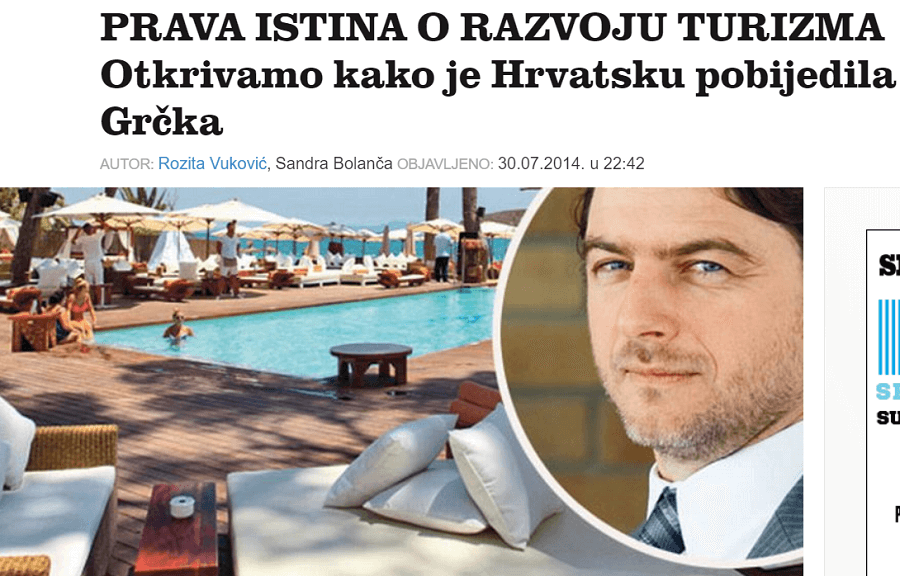
My article became the top news story in Croatia's leading newspaper, Jutarnji List, the following day. Their two-page feature included a quote from the then Minister of Tourism, Darko Lorencin.
I invite the Croatian media to take a look at the comparison between Greece and Croatia once more, but this time for another topic - the official response to restarting tourism, a key part of the economy for both countries (20% of GDP in Croatia's case).
Firstly, Go Greece! The news is everywhere (here in The Guardian, for example): Greece has a coherent plan for its tourism restart.
And here is Greece again, on the homepage of the BBC.
Not only a plan, but a really good plan - marvel at the transparency, communication and level of detail in this.
Well done, Greece - may you have a successful salvage of the rest of the season.
So coherent is the Greek message that it made it onto this VERY useful timeframe of international travel reopening.
Of Croatia, there was not a mention. Both countries are in the EU, so must adhere to the same rules.
Meanwhile, over in the Kingdom of Accidental Tourism, I do encourage you to check out the Ministry of Tourism website in English, for it really is a quite sensational read at the moment. Here was the homepage yesterday morning (small background reminder - we are in the middle of the COVID-19 era):
Yes, you read that right. In the middle of a global pandemic, with shares of Zoom going through the roof at a time when people are questioning whether the concept of conference tourism will even exist, the Kings of Accidental Tourism are less concerned with restarting tourism and doing what they can to help those thousands of tourism businesses which depend on tourism, and more concerned with self-congratulation. Click on the article, because it gets better:
"After various world associations held 114 conventions in Croatia in 2018, even more conventions were held in 2019, 123, and Croatia went up four places in the ICCA rankings, to the 34th place globally by the number of conventions held. That is the highest position Croatia has taken to date, which also confirms its status as the leading conference destination in the region," said HTZ director Kristjan Stancic.
He thinks this is great news for Croatia's conference tourism, which is on an upward trajectory, as well as for Zagreb, which has taken the 48th place in the ICCA rankings for conference cities, jumping up by 20 places compared to 2018.
I would be really interested to see the official projections for the 2020 'upward trajectory' for conference tourism in the corona era.
And what is the current top story of the day at the Ministry of Tourism, as Greece grabs all the global headlines in the travel industry?
I kid you not.
But this really is great progress.
Croatian Minister of Tourism Gari Cappelli, owner of perhaps the finest tourism slogan in a pandemic ever - Croatia Breathes Tourism - has been in the job four years.
And he has certainly been busy preparing for the restart of tourism.
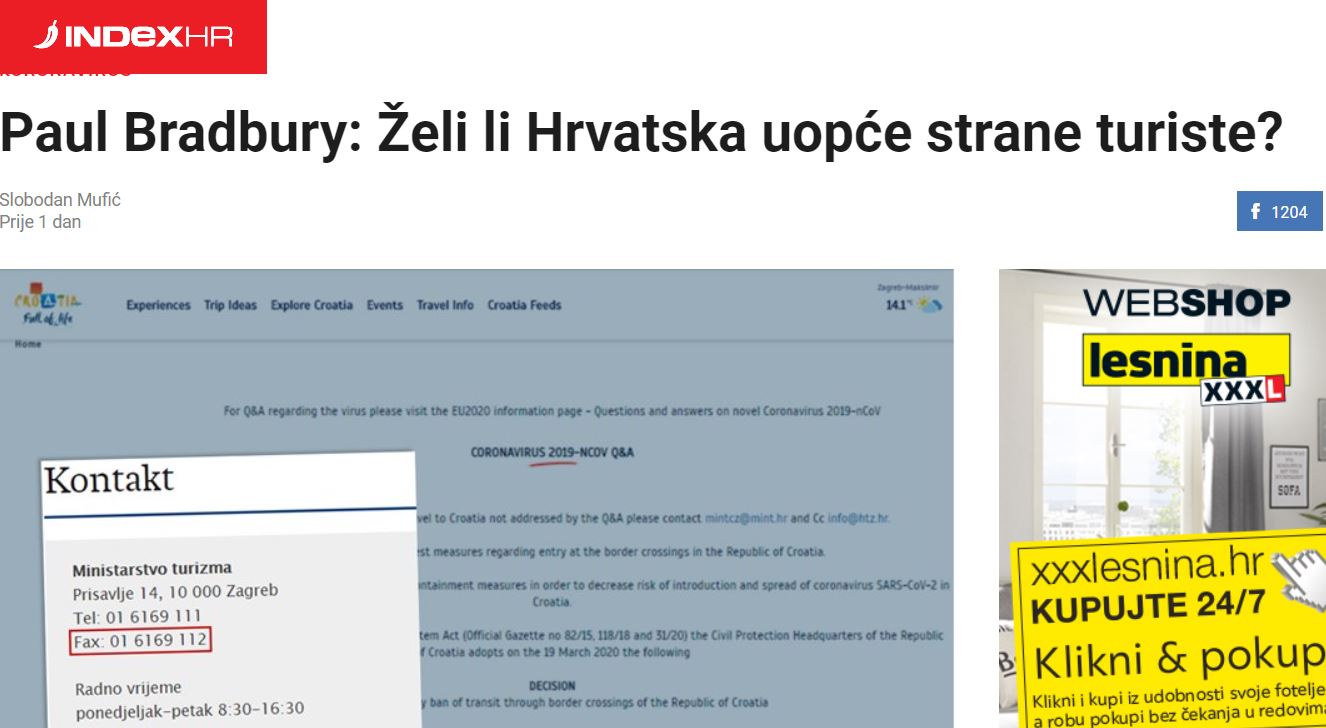
After an article from Croatia's leading news portal, Index.hr made the headlines 2 weeks ago, within two hours, he had managed to abolish the fax machine from the Ministry of Tourism website altogether.
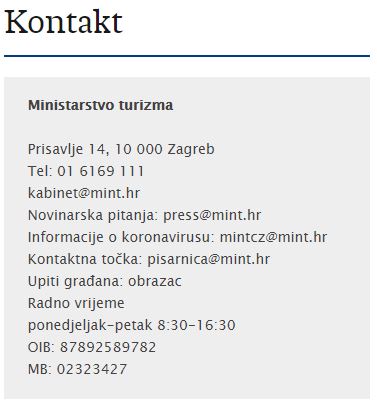
In the same article, it came to light that according to the Ministry of Tourism, not only was there no COVID-19 information on its website, but there was seemingly no corona information at all.
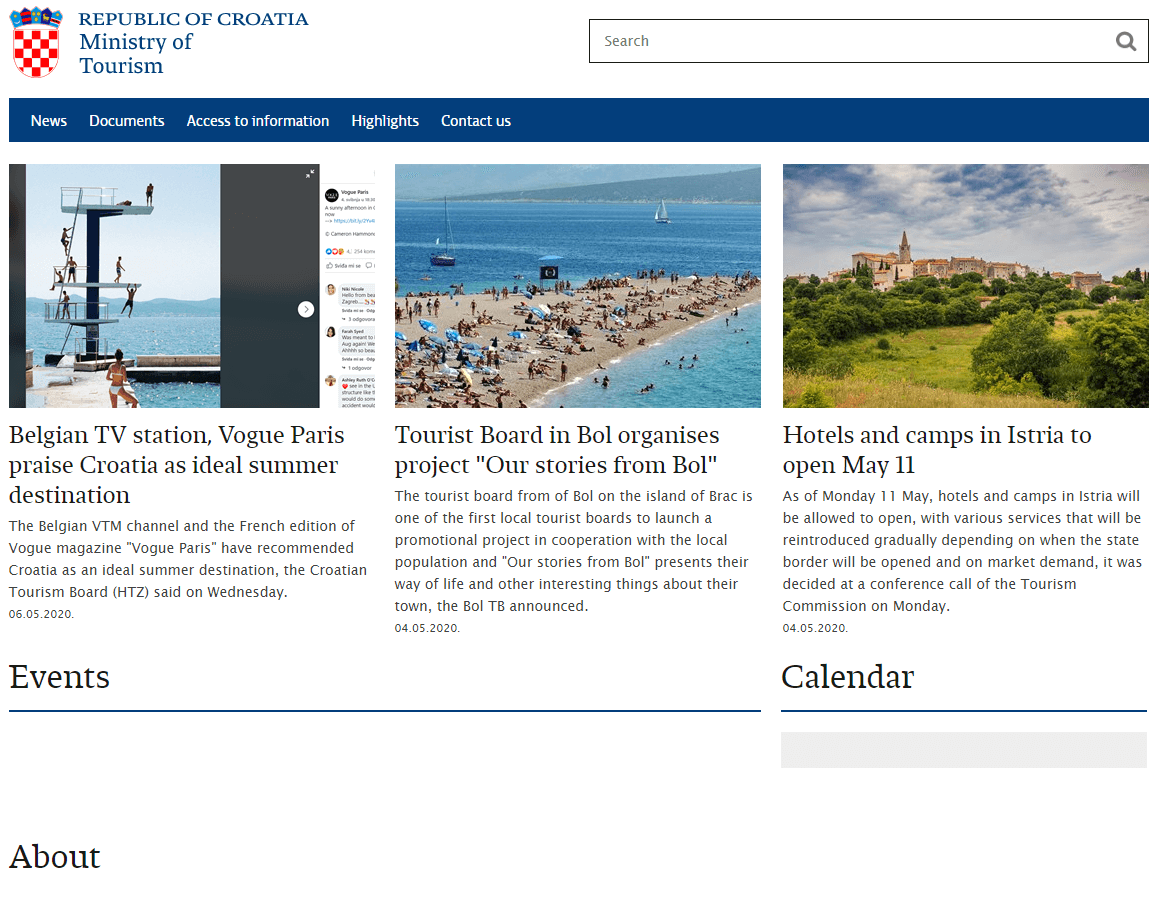
This is how the homepage looked on May 6, 2020.
I got some hope when a dedicated COVID-19 section appeared, about the same time that the fax machine disappeared.
With no useful travel info.
My hopes were raised once more when the Deputy Minister of Tourism asked me to send questions to create a dedicated info page for the ministry and also to be shared by TCN.
10 days later - no information page, no answer to my questions from the Ministry of Tourism. Thankfully, the Ministry of the Interior was a lot more forthcoming, and you can find some useful info here.
So there you have it. Croatia v Greece - who wants your tourist dollar more?
And if you are planning a large conference, come to the Kingdom of Accidental Tourism. Our conference tourism is on an upward trajectory, baby. Hop on board before you miss out on the ride.
For more on the brilliance within the corridors of power in the Mighty State of Uhljebistan, check out our dedicated section.
Booking.com: 48% of Croats Want to Travel within Croatia, Apartments Most Popular
May 22, 2020 - Although travel plans are currently on hold, data collected by Booking.com reveals that this has not stopped travel enthusiasts from daydreaming. A look at how travelers in Croatia plan to vacation after the corona crisis.
HRTurizam reports that after reviewing the millions of “Wish Lists” travelers have created on Booking.com over the past two months, with more than 100,000 different destinations recorded since early March, Booking.com has decided to share the top destinations and accommodation units travelers have been thinking about as they wait for when they can start traveling again.
Destinations such as Bali, Andalusia, London, Florida and Paris continue to inspire travel enthusiasts around the world, but due to the uncertain situation in the last two months, as many as 51% of travelers globally have chosen destinations within their country. At the same time, 33% of travelers expressed a desire to visit domestic destinations.
In 2020, as many as 48% of those wishing to visit destinations within Croatia is on the Wish List, which represents an increase compared to 2019, when 38% of domestic passengers said so.
Since the beginning of March, Zagreb, Split, Zadar, Dubrovnik, Opatija, Rijeka, Makarska, Rovinj and Osijek have been at the top of the wish list of domestic destinations from Croatia, which tells us that travelers are looking forward to visiting sunny cities on the coast and beaches, but also the hustle and bustle offered by the big cities in the interior after weeks spent in isolation. Travelers who have already visited these destinations recommend them for their history and beautiful old buildings, walks along rivers or the sea and friendly people.
When we talk about adventures abroad, travelers from Croatia mostly dream of big European cities of culture as well as destinations in neighboring countries. In that list, Istanbul (Turkey) was in the first place, then Budapest (Hungary), London (UK), Belgrade (Serbia) and Paris (France), and in the top destinations were Rome (Italy), Lisbon ) and Sarajevo (BiH).
Also on the Wish List of countries that travelers from Croatia would like to visit are Italy, Turkey, Spain, the United Kingdom and Serbia. Nevertheless, domestic destinations are still a favorite of travelers from Croatia on the Booking.com Wish List.
While dreaming of changing the environment and spending the night outside their home, travelers from Croatia most wanted to stay in apartments, hotels, guest houses, cottages, and resorts. As many as 41% of travelers from Croatia during the last two months have expressed a desire to stay in apartments, which is much more than the global average of 20%.
The three most desirable accommodation units in Croatia for travelers from Croatia are Apartments Lisinski in Zagreb, Madison Luxury Apartments in Zagreb and Plitvice Holiday Resort in Grabovac. The most desirable accommodation units outside Croatia for travelers from Croatia are Apartment East West (Belgrade, Serbia), Nusha Apartments (Belgrade, Serbia) and Alpin Panorama Hotel Hubertus (Trentino Alto Adige, Italy).
"These are challenging times where security is a top priority. At Booking.com, we know that in times like these, thinking about how we’re going to explore the world again has great power that brings us inspiration and a good mood. It’s amazing to see the range of different travel experiences our customers dream about during the period they’ve been waiting for the opportunity to pack up and hit the road again," Maja Vikario, regional manager, told Booking.com.
Interestingly, on the top 1000 global list of the most desirable destinations in the world, there are as many as nine regions from Croatia with Split-Dalmatia County at the top, after which Istria and the Dubrovnik-Neretva County are on the list.
To read more about travel in Croatia, follow TCN's dedicated page.
Good News for Omis, Makarska, and Dubrovnik: FlixBus Returns to Southern Croatia
May 22, 2020 - After the Croatian Civil Protection Headquarters relaxed coronavirus measures and adopted new rules and instructions on behavior in public inter-county passenger transport, FlixBus returned to the roads on May 11, 2020, and connected Zagreb and Varaždin with cities such as Zadar, Split and Trogir in Croatia.
However, HRTurizam reports that from May 28, the southern part of Croatia will be connected even further, and the popular green buses will be able to travel all the way to Omiš, Makarska, Ploče, Opuzen, Metković and Dubrovnik.
"The opening of the first lines clearly showed us the great demand and need for passenger migration within Croatia. Accordingly, it was decided to start with bus lines to extreme southern Croatia," said Ante Grbeša, director of the FlixBus CEE South region.
“Bus transport of passengers, even after the coronavirus situation, should remain an important part of a sustainable and affordable way of traveling. The permitted capacity on existing FlixBus bus lines is mostly full. We expect further easing of the measures of the Civil Protection Headquarters in order to continue with unhindered traffic throughout Croatia and enable passengers to realize their planned tourist or business trips," added Grbeša.
By the way, the increase in the number of tourists arriving from abroad by FlixBus buses, from season to season, has grown by up to 80% to certain destinations. The FlixBus green network of bus lines extends to 29 European countries and connects 2,000 destinations with 350,000 daily lines.
Passengers are encouraged to think about their safety when buying their tickets and use the online way of purchasing them through a free mobile application or via the company's website. This will reduce unnecessary physical contact and long queues. Special attention is being paid to enhanced hygiene and to the disinfection of the bus area for passengers and drivers, protective equipment for drivers has been made available, as has the regulated boarding and disembarking of passengers.
"The safety of passengers and drivers is paramount at the moment. Therefore, we immediately closed the sale of the first row of seats to be able to protect the driver, and we're distributing passengers according to the instructions placed diagonally to the seats. Drivers are obliged to wear masks and gloves as well as disinfect their space, while passengers are recommended to wear their own masks for additional protection according to the given instructions and measures,'' added Grbesa.
Further preventive protection measures relate to the disinfection of the bus that will be performed at the end of each journey as well as the placement of disinfectant that will be available to all passengers upon entering the bus area.
In addition, passengers will enter the bus via the back door, passenger tickets will continue to be registered without physical contact via QR codes and through the use of the mobile phones of drivers, and toilets in the buses will be closed for use until further notice.
To read more about travel in Croatia, follow TCN's dedicated page.
Croatian Startup Develops Application to Monitor Spending of Public Money
As Novac/Matea Grbac writes on the 21st of May, 2020, the innovative Croatian startup, Fortis Labor, has developed an application which promotes transparency aimed at cities and associations for the monitoring of the spending of public money.
The move represents a new upgrade to their ''Email notification system'' app, better known as SOM. Although the whole system was created primarily as an auxiliary tool for sports associations, it quickly became clear that it could quite easily be applied to all kinds of associations, and that it can also serve as a tool for the more clear cut and transparent monitoring of the distribution and spending of earmarked funds paid from the city budget.
Its main feature, points out the founder of this Croatian startup, Lorenzo Gasparic, is that the application can be accessed from any device, whether it is a mobile phone, tablet or simply a laptop.
''Through this system, the city always has an insight into how and in what way public money is being spent. So far, this hasn't been possible. Namely, at the beginning of the year, the city would announce a public tender to which associations would apply, which would then be allocated a certain part of those funds. They would then justify the money spent to the city only at the end of the year by submitting a yearly report. In this way, through a just a few clicks, associations can immediately enter data, or attach an invoice for the funds spent, and this information is then visible to everyone and is made available in real time,'' he explained.
In addition to easier and faster entry of invoices, associations have an insight into the remaining funds through this Croatian startup's useful system, while cities receive all the data in one place, and a more transparent way of doing business with reduced paperwork is thus provided.
Gasparic added that this system is really impossible to cheat because even if someone receives funds for one item, and tries to justify the money spent in some way when it was actually spent on something completely different, everything is always made perfectly clear through this system and there can be no such cover ups.
''Let's put it this way. If some association has received funds for the maintenance of a field, and instead a bill from the restaurant is attached and someone accepts it as a valid excuse, later on, during the check, someone can catch you committing that sort of fraud. Which person approved it remains in the system, and I doubt that someone would risk playing with their own career by trying to cheat like that,'' he noted.
Currently, this Croatian startup's system is used by about 200 associations which are mostly sport oriented, they're from Bjelovar, Sisak, Vodnjan and Rovinj, while Vrbovec was the first to use this system to monitor the work of 89 sports and non-sports associations within the city.
''We started engaging in negotiations with cities back at the beginning of the year, and now we have five more cities that want to use our system. Of course, these conversations have now come to a halt due to the coronavirus crisis, but our goal is to offer our application to everyone. I think that only now, after the pandemic, has it become clear just how important transparent and digital business truly is,'' he said.
The value of the entire project stands at a huge 1.3 million kuna, of which 80 percent has come from European Union funds, which marks the second project of a Croatian startup from Zagreb financed in this way. Fortis Labor doesn't plan on stopping there, either.
Next year, they plan to offer cities a similar programme through which the digitisation of applications for public tenders can be enabled. In this way, they would connect the new system with the existing one and thus almost eradicate the infamous and daunting Croatian paperwork which is typically involved in such processes.
For more, follow Made in Croatia.
Year-Round High Speed Lastovo-Korcula-Dubrovnik Line Being Introduced
The introduction of a high speed maritime connection between Lastovo-Korcula-Dubrovnik that will operate throughout the entire year is sure to bring relief to many, especially to southern Dalmatia's island inhabitants who often have to deal with irregularities in maritime connections with the mainland and indeed other islands.
As Morski writes on the 21st of May, 2020, at a recently held session, the Croatian Government adopted an amendment to a previously taken decision on determining state lines in terms of public transport, with its focus on this occasion on regular coastal maritime transport.
This decision will see the very welcome introduction a new year-round high speed line operating along the route: Lastovo-Korcula-Dubrovnik, and vice versa, with the aim of better connecting beautiful Lastovo with its county centre - the City of Dubrovnik.
The introduction of this brand new line will contribute to the improvement of the economic and tourist development of Dubrovnik-Neretva County as a whole and will ensure the better connection of the popular islands of Lastovo and Korcula with Dubrovnik, as well as the proper and constant interconnection of these two islands.
Regular public transport in what is referred to as regular coastal maritime transport in the Republic of Croatia includes 53 state lines, with a total fleet of 77 ships in operation along them.
Funds for the new high speed Lastovo-Korcula-Dubrovnik line, as well as for the other 53 state lines which exist in this segment of public transport in the Republic of Croatia, are provided for in the state budget, in the total amount of 329.5 million kuna for the year 2020, with projections of the required annual funds for 2021 and 2022 in the amount of 340 million kuna foreseen.
For more on maritime connections, islands, border crossings, destinations along the coast, the islands and in the continental part of the country, follow our dedicated travel page.
VIDEO: Ultramarine - 128 Metre-Long Polar Cruiser Launched in Split
As Poslovni Dnevnik writes on the 21st of May, 2020, the loan for Ultramarine's construction was provided by HBOR, and the guarantee was given by the Government of the Republic of Croatia back on the 16th of May, 2018 with its decision.
A few days ago, Newbuild (Novogradnja) 487, a passenger ship for polar expeditions, which will be named "Ultramarine", was launched in the Shipbuilding Industry Split.
The President of the Management Board of Brodosplit, Tomislav Debeljak, thanked the workers of the Split shipyard for being able to complete such a significant project in the challenging times of the coronavirus.
The technologically advanced ship for polar expeditions has been contracted with the American company Quark Expeditions, part of the Travelopia Group, which has in its portfolio a number of world companies specializing in adventure travel.
The ultramarine is 128 metres long and 21.5 metres wide, and will be able to accommodate up to 200 passengers who will be cared for by 140 crew members in 103 luxuriously decorated cabins and public spaces and will have an incredible range of adventure options for all of them. Otherwise, the value of the ship is over 106 million euros. The loan for its construction was provided by HBOR, and the guarantee was given by the Government of the Republic of Croatia on 16 May 2018 with its decision.
"After the delivery of the ''Hondius'' polar cruisers, which to the great satisfaction of irs owners and users completed its first Arctic and Antarctic season, this ship will be the new pride of Croatian shipbuilding and the confirmation of Brodosplit's entry into the market of passenger ships of up to 200 metres in length which compete well in the niche of the builders of some of the most modern polar cruisers,'' read a statement from the well known Split-based shipyard - Brodosplit.
Watch the video of Ultramarine's launch below:
For more, follow our lifestyle page.


